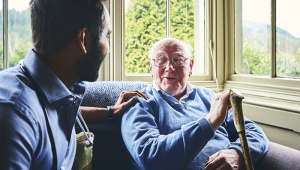There are 31 integration boards, with a combined budget of almost £9bn, across Scotland. Each is responsible for the strategic planning and commissioning of health and social care services in their area.
However, a report from Audit Scotland found that none of the boards had longer term financial plans in place and only a third had planned for the medium term.
“This is a critical gap as the changes under integration are only likely to be achieved in the longer term,” the report said.
“Financial planning is not integrated, long-term or focused on providing the best outcomes for people who need support.
“This is a fundamental issue which will limit the ability of integration authorities to improve the health and social care system.”
Financial pressures also made it difficult for authorities to make sustainable changes to the way services were delivered, the report found.
Although boards reported an underspend of almost £40m in 2017-18, this masked a “much more complex picture” that had seen many boards struggling to achieve financial balance due to rising demand for services, budgetary pressures and the quality of financial planning.
Over half had been forced to seek bailouts worth almost £33m from NHS boards, while ten had sought additional money, worth £19m, from councils. Eight councils had drawn on reserves, amounting to just over £9m in total.
Audit Scotland also found that change was hindered by a lack of collaborative leadership, and highlighted senior management turnover, significant variation in the role and remuneration of chief officers and lack of support services as particular problems.
Only half of boards had a full time chief finance officer, and there had been difficulties filling these roles, the report said.
Cultural differences between health and social care partners were another barrier, it found.
“Partner organisations work in very different ways and this can result in a lack of trust and lack of understanding of each other’s working practices and business pressures,” the report said.
Auditor general Caroline Gardner said all partners, both nationally and locally, had to work together to deliver integrated health and social care.
“This will allow people to receive the care they need at the right time and in the right setting, with a focus on community-based, preventative care,” she said.
Graham Sharp, chair of the Accounts Commission, said that although there were examples of integrated health and social care services making a positive difference, these tended to be “local and small-scale”.
“The potential for a profound and long-term shift in the way health and social care services are delivered is clear, but there is still a long way to go,” he said.
Responding to the report, health secretary Jeane Freeman said improvements were already being seen in terms of balance of care in communities and hospitals but agreed further action was required by all partners.
“We want to step up the pace and agree that further progress requires our strong, shared leadership,” she said.
“Integration is the most significant reform to health and social care services since the creation of the health service…changes this ambitious take time.”
Stuart Currie, health and social care spokesperson for the Convention of Scottish Local Authorities, said the review of progress now underway by councils and the Scottish Government would address many of the issues identified in the report.
“Integration is beginning to make a demonstrable improvement to the health and social care system, but more needs to be done to realise its full potential,” he said.











